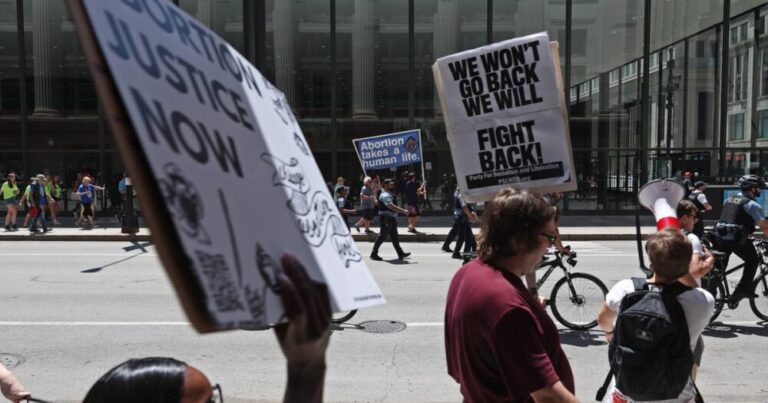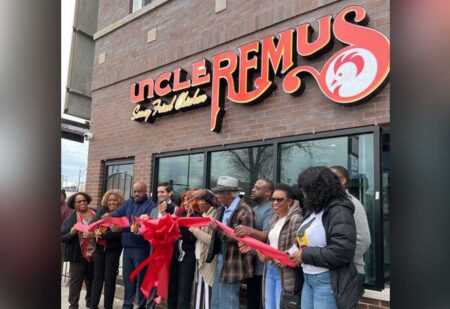The “rage giving ” did not last. Abortion access groups who received a windfall of donations following the Supreme Court’s overturning of Roe v. Wade one year ago say those emergency grants have ended and individual and foundation giving has dropped off.
After the Dobbs decision, some major funders of abortion access also have ended or shifted funding from organizations working in states where abortion is now banned, said Naa Amissah-Hammond, senior director of grantmaking with Groundswell Fund, which funds grassroots groups organizing for reproductive justice.
Women’s health and foster care nonprofits, who expected increased demand in areas where access to abortion has been eliminated or restricted, say they also haven’t seen increased support.
Holly Calvasina said her experience as director of development at the reproductive health clinic CHOICES in Memphis, Tennessee, might provide an explanation. Like many working in the reproductive rights sector, Calvasina said she tried to prepare for the increase in need, even before a draft of the Supreme Court decision was leaked in May last year. While some funders saw the writing on the wall and stepped up support, others wanted to wait and see.
“I think (that) really speaks to kind of a fundamental issue with philanthropy and responding to an emergent crisis,” Calvasina said. “Philanthropy moves really slowly and human rights crises unfold quickly.”
The rollercoaster of giving also showed up for CHOICES in the $150,000 in donations to their annual spring appeal last year. That’s up from $2,000 in 2021. This year, the appeal raised $40,000.
Organizations in states where abortion has been banned or limited have needed to pivot, said Marsha Jones, executive director of The Afiya Center, based in Dallas. Her organization used donations received after the Dobbs decision to expand its birthing center, but she said funders are less interested in supporting maternal health than they were in supporting advocacy and practical support for abortions. She argues, as she has for years, that supporting reproductive justice is more than supporting abortion access.
“It is literally people wanting to choose full bodily autonomy,” she said of those choosing to carry a pregnancy to term and others who do not.
Data on last year’s charitable giving to any sector is hard to come by. The pandemic has slowed the public release of donor reports to the IRS, though a delay of up to two years was typical even before COVID-19 hit.
Donations to human services and public society benefit organizations, sectors that could include abortion access nonprofits, both declined in 2022, while donations to health organizations increased 5%, which is actually a decline when adjusted for inflation, according to the Giving USA report released last week.
But a special layer of opacity exists around funding for abortion access. Many donors fund anonymously, sometimes requiring grantees not to publicly disclose the source.
The largest historic funder, The Susan Thompson Buffett Foundation, eventually makes gifts public through tax filings, but the organization does not comment on support for abortion access and did not respond to questions about whether or how its funding strategy changed in response to the Dobbs decision.
Another large funder, The David and Lucile Packard Foundation, said it is shifting its grantmaking after Dobbs. It stopped funding sex education programs in schools and ended funding for abortion services that closed due to new laws. The foundation also added $14.1 million in funding last year to “shore up providers in safe haven states,” and to help people find and access abortion care.
The William and Flora Hewlett Foundation said it provides steady support to grantees in all states to fund abortion care where it remains legal or advocacy against bans.
In general, giving to organizations specifically serving women and girls represents less than 2% of all donations, according to a research project of the Women’s Philanthropy Institute at Indiana University’s Lilly Family School of Philanthropy.
Calvasina thinks anonymous funding, especially from the largest foundations, perpetuates inequality within the movement. Others in the sector said donors have many reasons for wanting to be anonymous, including to avoid being targeted by groups opposing abortion.
One measure of the potential amount of funding available to reproductive health organizations is the extent of gifts from donor-advised funds hosted by the Silicon Valley Community Foundation to Planned Parenthood affiliates across the country. Those donations exceeded $98 million in 2022, according to data from Candid, a nonprofit that compiles information about charitable giving. The foundation declined to speak about the gifts, citing its policy not to comment on DAF grants.
Seeing a drop in giving after a major event is not that unusual, said Una Osili, associate dean for research and international programs at the Lilly Family School.
“If you think about the decision to give, whether it’s to a natural disaster or crisis, people hear about it and they want to participate to make a difference,” Osili said.
Danielle Gletow, founder and executive director at One Simple Wish, a nonprofit connecting donors with foster children who have specific requests, said people are seeking out groups like hers offering direct support. But she worries that abortion access restrictions may further strain the foster care system.
In Texas, where the state’s child welfare program is so overwhelmed that children sometimes sleep in office buildings, foster care workers fear the state’s strict laws on abortion may force women to have children for whom they cannot care, adding to the foster children population.
“I don’t think it’s possible to break anything worse when it’s already broken, if I’m being honest,” Gletow said. “This is a system that’s incredibly broken.”
[ The first year without Roe v. Wade: How abortion access has shifted in Illinois and beyond ]
Philanthropic support has surged to states such as New Mexico, which passed laws protecting access to abortion and shielding abortion providers while bordering Texas and Oklahoma, where abortion is now banned. A coalition of local groups publicly asked incoming funders and groups to coordinate with them as recently as February.
Charlene Bencomo, executive director of Bold Futures, a leader of the coalition, said they ask new providers to accept Medicaid, which can cover abortion in the state, and to offer reproductive health services outside of abortion care.
“We continue to look for a higher quality of care, a better quality of care for our folks in New Mexico and for those who need to come here to access care that they cannot in their home state,” Bencomo said.
Amissah-Hammond, of the Groundswell Fund, said she’s waiting to see if funders who responded with emergency or one-time grants last year will continue to fund abortion access over the long term. For funders concerned about legal liabilities, she suggested they offer general operating support, rather than project-based grants, and accept updates over the phone.
“We’re learning a lot from our peer funders who have been funding in global contexts,” she said. “Where work for reproductive rights, health and justice has been criminalized for a long time and where LGBTQ rights has been criminalized and work, frankly, for democracy has been criminalized.”







